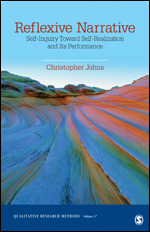Reflexive Narrative
Self-Inquiry Toward Self-Realization and Its Performance
- Christopher Johns - University of Bedfordshire, UK
Qualitative Research Methods
“The author has put a lot of thought and attention into this work. It is very much appreciated. This is the way the field can advance.”
“The manuscript is rich with the author's experience and reads well.”
“The author is clearly an expert in the research design with her vast wealth of experience.”
“The author's voice is one that commands respect, connection, inspiration, and stimulation. The argument and idea of the book are strong, and highly merit publication.”
“There is a great need for texts on this subject”
Sample Materials & Chapters
Chapter 1: Contempt A Barrier to Realizing Leadership
Chapter 2: The Reflexive Narrative Bricolage

